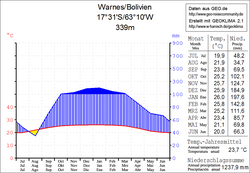Rancho Nuevo (Mineros)
| Rancho Nuevo | ||
|---|---|---|
| Basic data | ||
| Full name | Comunidad Rancho Nuevo | |
| Residents (state) | 509 pop. (2012 census) | |
| height | 254 m | |
| Post Code | 07-1003-0105-0001 | |
| Telephone code | (+591) | |
| Coordinates | 17 ° 6 ′ S , 63 ° 11 ′ W | |
|
|
||
| politics | ||
| Department | Santa Cruz | |
| province | Obispo Santistevan Province | |
| climate | ||
 Climate diagram Warnes |
||
Rancho Nuevo is a town in the Santa Cruz Department in the lowlands of the South American Andean state of Bolivia .
Location in the vicinity
Rancho Nuevo is a place in the district ( Bolivian : Municipio ) Mineros and is located in the province of Obispo Santistevan at an altitude of 254 m in the wetland between the Río Piraí and Río Grande .
geography
Rancho Nuevo is located in a tropical, humid climate in front of the eastern edge of the Andes mountain range of the Cordillera Oriental . The region was covered by subtropical rainforest before colonization , but is now mostly cultivated land .
The mean average temperature of the region is just under 24 ° C (see Warnes climate diagram), the monthly values fluctuate between 20 ° C in June / July and 26 ° C from November to February. The annual precipitation is about 1300 mm, the monthly precipitation is productive and lies between 35 mm in August and 200 mm in January.
traffic
Rancho Nuevo is located 89 kilometers by road north of Santa Cruz , the capital of the department.
From the center of Santa Cruz, the paved road Ruta 4 leads 57 kilometers north to Montero , from there regional roads lead via the city of General Saavedra to Mineros, 26 kilometers away, to the north . There a side street branches off in a north-easterly direction and reaches Rancho Nuevo after a further six kilometers.
population
The population of the village has doubled in the decade between 1992 and 2001. Detailed data from the 2012 census for the village are not available:
| year | Residents | source |
|---|---|---|
| 1992 | 277 | census |
| 2001 | 509 | census |
| 2012 | no detailed data | census |
Due to the immigration of indigenous populations from the Altiplano , which has been forced by politics since the 1960s , the region has a not inconsiderable proportion of Quechua population, in the Municipio Mineros 23.3 percent of the population speak the Quechua language.
Individual evidence
- ^ INE - Instituto Nacional de Estadística Bolivia 1992
- ^ INE - Instituto Nacional de Estadística Bolivia 2001
- ↑ INE - Instituto Nacional de Estadística Bolivia 2012 ( Memento of the original from July 22, 2011 in the Internet Archive ) Info: The archive link has been inserted automatically and has not yet been checked. Please check the original and archive link according to the instructions and then remove this notice.
- ↑ INE social data 2001 (PDF; 12.2 MB)
Web links
- Santa Cruz Region - Relief Map 1: 250,000 (PDF; 7.88 MB)
- Montero region - topographic map 1: 100,000 (PDF; 8.2 MB)
- Municipio Mineros - General Maps No. 71003
- Municipio Mineros - detailed map and population data (PDF; 710 kB) ( Spanish )
- Department Santa Cruz - Social data of the municipalities (PDF; 4.99 MB) ( Spanish )
